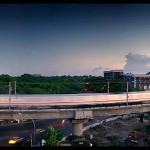Shahid Burki is one Pakistani commentator that I have liked a lot.. here is one of his Opinion pieces which tries to bring out differences between India and Pakistan.
WHILE I was in India last month I came across an American friend who had also travelled to Delhi to pursue some interest in development economics. This was his first visit to the country and he was initially very impressed with what he saw. He had also read Thomas Friedman’s book from which I quoted in the column last week. “India is indeed an economic superpower; one that will change the structure of the global economy”, he said to me, fully agreeing with Friedman’s thesis.
My friend was impressed with the hotel in which both of us were staying; impressed with the sights and sounds of Delhi; impressed with Gurgaon, the centre of Delhi’s high-tech economy; impressed with the way the Indian middle class was engaged in their country’s development.
He also liked what he saw of Indian art, Indian music, and the country’s film history. He asked me whether there was much in common between India and Pakistan; after all the two were once part of the same economic and political entity. When I said that the two countries had much in common and that what he had read and heard about Pakistan was not the Pakistani reality, he seemed very sceptical about my response. I am sure he attributed it to a misplaced sense of patriotism.
When I left Delhi and returned to Washington, my American friend and his wife went on a tour of the “golden triangle” — tourist sites in Delhi, Agra and Jaipur. They then saw a great more of the real India. Remembering the conversation we had he called me upon returning to the United States. He said that he had seen two Indias; one was well integrated into the global economy, the other was poor, extremely crowded, with poor infrastructure, poor housing, and an incredible number of street dwellers. The second India was not very different from Africa, a continent he knew well. He was now not very sure whether to see India as a success story or one still struggling very hard to succeed.
This account of first and second impressions of a development expert from the West raises a number of important questions. Why is there now so much talk in fairly informed circles about India becoming an economic superpower? Why do so many commentators such as Thomas Friedman believe that India, en route to becoming a superpower, will be able to overcome fairly quickly a number of obstacles that have kept so many developing countries trapped in poverty and backwardness? Why is it that so many people see so much negative in Pakistan and so much positive in India? What are the lessons that Pakistan could learn from India’s success and how could it also develop a different image for itself other than the one popular in the West? Why was it that while India was widely viewed as a rapidly modernizing society, Pakistan had come to be seen as backward and unwilling to join the rest of the world? In other words what has contributed to India’s seeming success and Pakistan’s seeming failure as economies and as political systems?
There are many reasons why the world views India and Pakistan so differently. I will mention four of them. The first is the way Pakistanis project their own country. The second reason is the amount of investment the Indians have made in higher education, the point underscored by Friedman in the passage quoted in the article published in this space last week. The third reason for the perception about India’s bright future is that it has now in place several institutions that work in various sectors of the economy. These institutions now have a record that provides comfort to the participants in the economy, both domestic and foreign. The fourth reason is the way the Indians have created a political system that accommodates diversity and allows participation to most segments of the population.
I will have more to say about these explanations over the next couple of weeks. Let me first deal with the damage Pakistanis themselves do to their image. In a recent conversation with me, L.K Advani in Delhi made an interesting point. He said while there are many differences among Indian politicians and political parties on domestic issues, there is almost complete understanding on foreign policy and how the country should be presented to the world outside. That is certainly not the case for Pakistan. Let me take one example of the difference between Pakistan and India in this respect.














